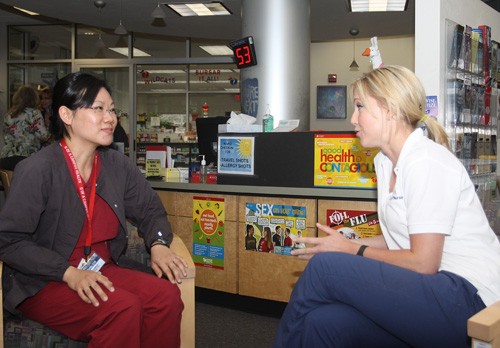Campus Health Services has seen a recent spike in Urgent Care traffic in response to the start of allergy season, said Lisette LeCorgne, a nurse practitioner and coordinator of Urgent Care.
“”For Urgent Care, we see an increase in visits in March and April and again in September, October and November,”” LeCorgne said. “”March and April are high months for increased allergens and particulate matter.””
LeCorgne believes the increase in the number of allergy cases is due to the pollen in the air and the lack of rain.
“”A lot of stuff pollinates right now, and we don’t routinely have the rains to wash stuff out of the air, so when stuff pollinates, and it’s windy, it’s like living in a dust cloud,”” Lecorgne said.
In the current environment, everyone is susceptible to the many irritants.
“”During allergy season, the high levels of dust or pollen in the air aggravates everybody, it’s not just people who have allergies,”” LeCorgne said.
It can sometimes take three to five years in a new environment to develop allergies. If a person has never had allergies before, LeCorgne explained, it does not mean they will not develop them.
“”The higher level of particulate matter in the air is irritating to a lot of people, so it’s important not to get stuck on the thought, ‘Oh gee, I don’t have allergies and have never had them,'”” she said.
Recognizing the type of irritant and treating it lessens the chances of an infection.
Viral infections are typically the first to occur and can be discerned if a fever appears. Infection can last anywhere from three days to two weeks. Bacterial infection would be at the end of the continuum, LeCorgne said.
If someone has a temperature of more than 101 degrees for longer than two weeks, he or she should seek medical attention, she added.
Dr. Paul Enright, WebMD’s allergy expert and a UA research professor of medicine and public health, wrote in a recent WebMD report how to manage allergies using over-the-counter medication.
“”Start by taking an over-the-counter, non-sedating antihistamine, such as generic Claritin or Zyrtec, every morning. If your nose remains congested, add a saline nasal rinse or oral decongestant pill (if you don’t have high blood pressure). You can also take a long-acting decongestant nose spray for a few days, if necessary. If these treatments don’t clear your nasal congestion, ask your doctor about adding a corticosteroid nose spray,”” he wrote.









